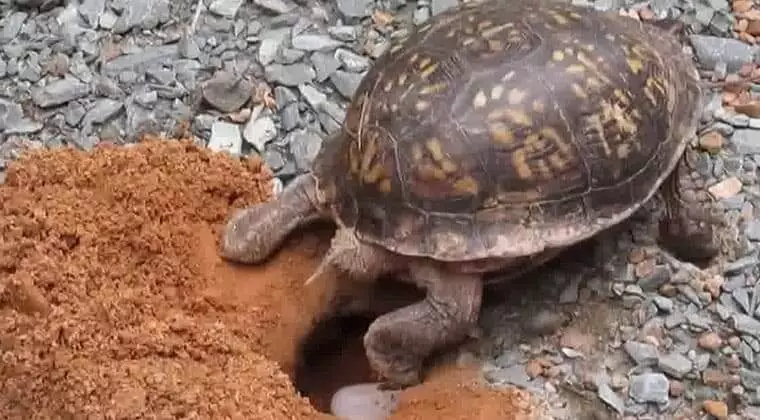Nesting season for many types of reptiles comes to a close, as turtles stop laying eggs to prepare for the long winter. There are approximately 356 species of turtle in the world today, but after seeing how quickly the population is declining, it’s important to understand how many eggs from different sizes and types of turtle hatch from.
Turtles lay eggs in masses of about 30-40 at a time. There are many different species of turtles, and their nesting habits have changed with time. A female turtle will release between 1 to 100 eggs in a clutch, but can still produce more in the following years. Turtles aren’t the only animals that lay eggs. What you might not know is that some turtles actually brood the eggs, keeping them warm and safe until they hatch!
Do Turtles Lay Eggs?
Almost all turtles lay eggs, but the number of eggs they produce can vary greatly. In the wild, some female turtles may lay up to 200 eggs at a time. In captivity, however, some females may only lay four or five eggs per year.
It is not only the number of eggs that these turtles produce that differs, but also how they produce them. A female turtle will usually lay a clutch (a group of eggs) at one time and then will go back to nesting again. In many species, this is done for about six days and during those days, the mother will eat almost no food at all.
Since their bodies are not burning calories, she needs to lay as many eggs as possible during those six days so that she can have enough energy to make it through this period. Once the babies hatch, she will stay in her nesting area until they are old enough to move out on their own.
How Many Eggs Do Turtles Lay?
Turtles are interesting creatures that are often appreciated for their unique ability to live in water. However, one of the more noteworthy features of these animals is their reproductive system.
In general, turtles lay eggs and these eggs can be found in various places on their body including their head and neck. While it varies from species to species, the average turtle will lay between ten and fifty eggs. So here is a listing of how many eggs turtles species lay.
| Turtles Name | Eggs Limit |
| Box Turtles | 3 to 12 Eggs |
| Flatback Turtles | 40 to 60 Eggs |
| Green Sea Turtles | 100 to 120 Eggs |
| Leatherback Turtles | 100 to 120 Eggs |
| Hawksbill Turtles | 140 to 160 Eggs |
| Mud Turtles | 3 to 10 Eggs |
| Snapping Turtles | 20 to 50 Eggs |
| Red-eared Slider Turtles | 15 to 30 Eggs |
| Softshell Turtle | 30 to 70 Eggs |
What Is The Average Turtle’s Egg Laying Rate?
The average turtle’s egg-laying rate is about one clutch per year. The parent turtle carries the eggs in various body orifices, such as between the fore-flippers or inside its mouth. Each clutch contains up to 100 eggs. The parent may lay several clutches during a single nesting attempt.
What Are The Factors That Affect Turtle Egg Size?
Egg size is controlled by other factors in addition to the mother’s species, the size of the clutch, and the age of the turtles.
The weight of a turtle’s clutch is a good indicator of how many days after hatching they will reach sexual maturity and begin breeding. An adult female will keep her eggs warm in her body cavity until they hatch, which can take up to 57 days at 68°F (20°C).
When the hatchlings leave her nest there is no need for her to warm them. A hatchling is a miniature version of its parent. Its shell will be the same size as its parent’s, but it will have lost all the algae that were on its body at birth.
How Much Time Does It Take To Lay An Egg?
Most turtles lay eggs between 24 and 60 hours, but some species can lay eggs up to 120 hours after mating. The species that lay the most eggs at once is the American map turtle, but it can take up to 40 days for the eggs to be laid.
How Long Do The Eggs Of Turtles Usually Last?
Even though they are the smallest type of egg, they can last up to 30 days if refrigerated. Typically, the eggs of turtles last anywhere from two to four weeks. While the eggs are best kept as long as possible, they should be trashed after four weeks to prevent them from going bad.
The turtles make use of these eggs to build their nests, and even though they are not being eaten by the turtle, they will go bad if the nest is left open for too long in direct sunlight.
If you can’t find a place to store it, then bury it in your garden or bury it on your property where no one else walks through.
In Summary
If you want to hatch some eggs of your own turtle (or help somebody else hatch theirs), there are a few things to keep in mind. First and foremost, it’s important to make sure the environment is suitable for turtles both climate-wise and indoors/outdoors. Secondly, you’ll need to provide the turtle with food and water at all times (unless they’re in aquariums).
